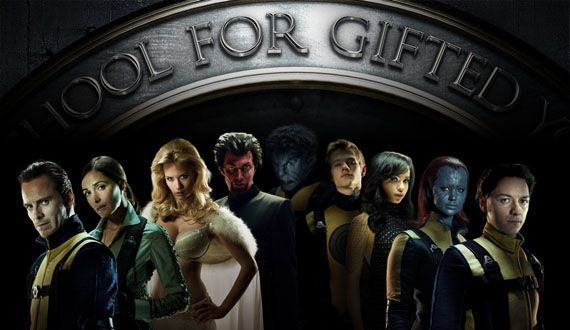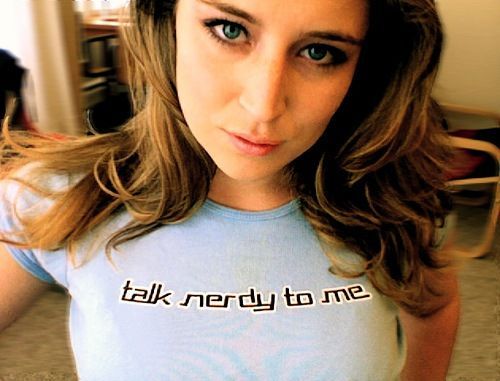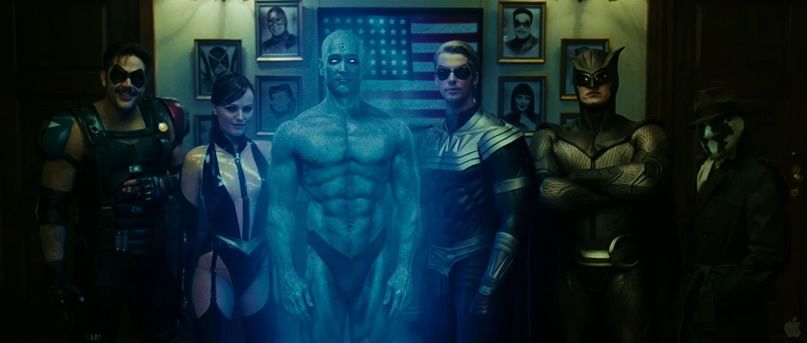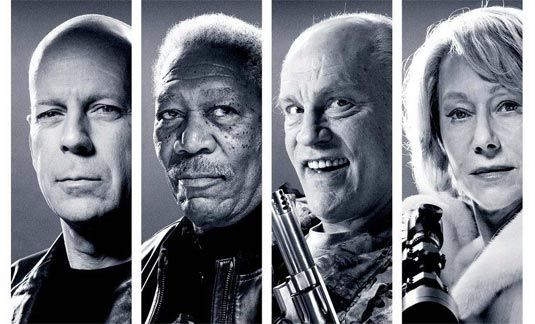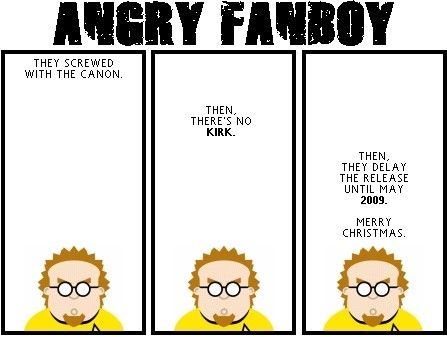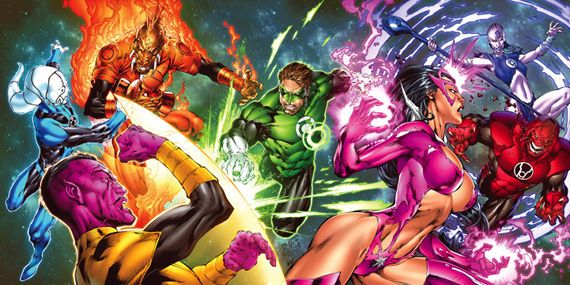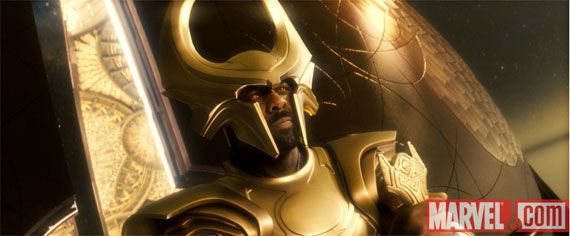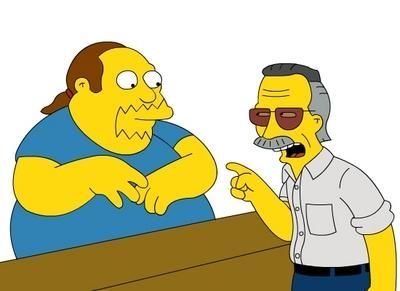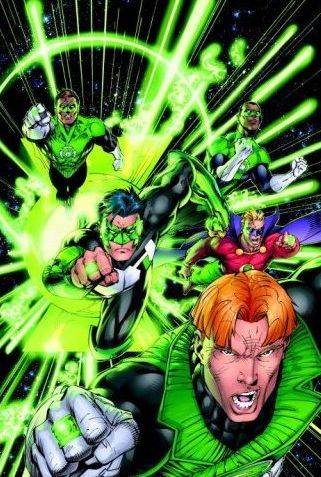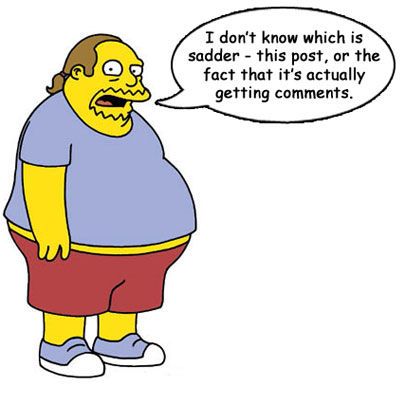As any member of the Screen Rant team can tell you, comic book movies are a volatile topic. For every new post we do about upcoming super hero films like The Amazing Spider-Man, X-Men: First Class, Ant-Man, The Punisher, The Dark Knight Rises, Superman: Man of Steel, Green Lantern, Thor, Captain America, or The Avengers - no matter if it's news, images, posters, or trailers - we often get a plethora of impassioned (or downright hostile) responses from the fanboy/fangirl community, which is o so protective of the superhero creations they worship.
After years spent engaging the opinions of fanboys and fangirls all over the world, there's one conclusion that I (and many among the Screen Rant staff) have come to: fanboy enthusiasm and reverence aren't necessarily the key ingredients to making a financially and critically successful comic book movie. Making superhero movies that honor the core essence of the source material, while transforming comic book tropes into more widely appealing cinematic tropes is, in fact, a much better approach - whether the fanboy community likes it or not.
The geek era has been great for superhero enthusiasts everywhere - as well as those geeks who have found new career opportunities in the expanding market of geek lifestyle and entertainment. If not for the new role of "geek chic" in mainstream media, we here at Screen Rant probably wouldn't even be able to do what it is we do everyday (and it's a pretty sweet gig, let me tell you :-)).
While I've loved seeing some of my favorite heroes from the comic book page find life (or renewed life) on the screen, like any great social trend, comic book movies have given rise to a perpetual cycle of knee-jerk reactions and misguided notions that fanboys and girls plaster the Internet with, every time another comic book movie takes a half-step forward in development.
This fanboy outcry wouldn't be an issue if Hollywood didn't care about fanboy opinion - but anybody who has been to the San Diego Comic Con in the last few years and seen the pandering to fanboys that occurs there, knows: When it comes to geek movies and merchandising, Hollywood is still trying hard to court what they view as a loyal, established, customer base. And although I may have my head severed for it, today I'm going to question whether Hollywood should stop trying to court the fanboy/fangirl community for their superhero movie releases, and instead focus on making comic book movies more appealing (read: profitable) to the larger demographic of moviegoers who DON'T engage in Cosplay at least once a year.
If you haven't already jumped to the comments in an attempt to slay me verbally, I'm sure you soon will. In the meantime...
-
The Most Fickle Fans
Check any Screen Rant post about a new comic book movie image or trailer (see: X-Men:First Class, Green Lantern and Captain America for recent examples...), and you'll see a comment section in which every single detail is dissected, over-analyzed and criticized to death - often before a full look at the completed film is ever made available to the public.
Now, please don't misunderstand: I don't mind that fanboys have opinions. Part of what I like about my job here at Screen Rant is engaging passionate fans about their opinions of geek films. Sure, saying that a movie is either terrible or great based on half an image or an early trailer is specious reasoning at best, but if the studios didn't want to stir that hornets nest they should only release the most carefully designed and polished promotional materials for their respective superhero movies. However, I doubt that anyone could truly map the fickle nature of some fanboy and girls' opinions: You know the type I'm describing - the ones who go from "I hate it! I hate it! I hate it!" to "OMG, it looks so awesome, I love it!" in the span of one well-designed trailer.
If we had nickels for every fanboy who posted comments swearing up and down that they will never see a particular comic book movie because a studio "ruined it," only to later turn around and post a comment about how much they actually enjoyed the movie, we'd probably be the wealthiest site on the Internet. The same goes for the reverse case: fans who swore something was going to be awesome, only to be let down by the final product.
Now this is nothing new for movies - promotional materials like trailers and posters can often be (purposely) misleading and can lead to moviegoers having the wrong impression about a film. The danger with geek movies is that the fanboy community has much more input and influence (thanks to the Internet) over how these films get greenlit, developed and marketed.
Sure, a lot of fans may not think that 20th Century Fox gives a damn about how they feel about the X-Men franchise - but it's undeniable that on the whole, studios listen to fanboys about superhero movies more than they listen to young couples' assessment of the latest trends in romantic comedies. But when you have the ear of those in power, it's important to have something reasonable and insightful to say. Knee-jerk reactions and flip-flop opinions don't really help anybody, which is why I say Hollywood should always take fanboy opinion with a HUGE grain of salt.
In the end, a movie's success is really going to depend on whether the average person thinks Spider-Man or Thor or Green Lantern "Look cool" - not the list of costume discrepancies Mr. Online Fanboy blogs about. Studios should be more concerned about whether or not the average person is taking notice of their superhero films, and what those people's opinions are. Because in the end, it's the opinion of the average moviegoer that will likely determine the box office returns...
-
Continue to fanboys as a niche market...
A Narrow Niche Market
I can't believe that there are groups of fanboys still out there screaming about the "travesty" that was Scott Pilgrim vs. the World's box office performance (a mere $47 million worldwide on a $60 million production budget). Sure, Scott Pilgrim was a fun film featuring a great cast, a witty script, and wonderfully stylized directorial vision by fanboy-favorite Edgar Wright (Shaun of the Dead). However, I've already admitted to myself what a lot of other fanboys and girls were unwilling (or able) to admit to themselves during Scott Pilgrim's development: That this property was always going to have limited appeal as a movie.
The success of films like X-Men and Spider-Man in the early 2000s gave Hollywood the impression that comic books and superheroes where a lane of profit just waiting to be tapped, and since then it seems that every studio has scrambled to the same well of comic book stories and characters. Again, Hollywood being fixated on certain trends that have worked isn't anything new (see the recent obsession with "re-imagined fairy tales" for a good example), but there are certainly degrees of appeal when it comes to comic book properties.
Spider-Man and Batman and Superman will always sell tickets, because those heroes have all transcended their respective comic book beginnings to become mainstream icons. Before I ever picked up a Spider-Man comic book, I already had a plethora of Spidey merchandise - underwear, bed sheets, lunch box, Halloween costume - and truth be told, the thing about Batman and Superman that people probably know the least about is what is going on in their respective comic books at the moment. A popular mainstream superhero is a much different thing than a popular comic book superhero, and as movies like Scott Pilgrim, Watchmen and Kick-Ass have all proven (at least when it comes to U.S. box office totals), lesser-known comic book properties have limited appeal for the larger moviegoing public, and the fanboy community - for all their passion - has very little box office clout when it comes to $upporting 'their films.'
There's a reason why "comic book geek" is still a low rung in the high school lunchroom social ladder. The soap opera-ish, sci-fi-heavy nature of comic books really only hold appeal for those with fantastic imaginations, or those trying to find escape from the pressures of the real world. Unless a movie features one of those superheroes who has transcended their comic book origins to become icons (Batman), or places much more emphasis on its cinematic identity rather than its comic book roots (Red), then making a movie like Watchmen - which practically recreated the panels of Alan Moore and Dave Gibbons' groundbreaking comic book shot for shot - is an extremely risky endeavor.
Of course, the box office success of 300 - an obscure comic book turned into a Rated-R movie - is the root of this specious notion that obscure comic book properties can be translated into hit films without compromising the source material. But again, how many people had read - or even knew about - Frank Miller's comic book before they saw that film? Not as many as fanboys may want to believe. What did get people in to see 300, then? Well, good old fashioned violence, stylized (read: "cool") movie making, and handsome, well-toned leading men - cinematic merits that have long appealed to your general movie goer.
The same can be said about last year's action flick, Red: take away the headlining cast of aging stars kicking butt, and do you really think that film would've done nearly as well ($90 million domestically on a $58 million budget) had it come with the sole logline of "Based on the comic book by Warren Ellis"? Yeah, I don't think so either...
-
Continue to the art of "retconning"...
No Respect for the Retcon
The thing about the fanboy community that has been getting under my skin lately is the somewhat hypocritical militant stance many within the community take with regards to what is and is not an acceptable approach to making a comic book movie. Head over to any one of our comment threads dedicated to X-Men: First Class, and you'll find more than few fanboys boycotting the film because of how it "ruins" the continuity of the X-Men comic books and the first trilogy of X-Men films that helped kick off the geek era in the early 2000s.
Fanboys are big sticklers for continuity: for the uninitiated, "continuity" in the comic book community means formulating new stories in accordance and remembrance of the old stories that came before - a tricky task when in some cases you're talking about half a century's worth of old stories. This tradition of honoring continuity has inevitably leaked into the arena of comic book movies, to the point that fans often get up in arms if ever and whenever filmmakers decide to change one little aspect of what fans perceive to be "the way it went" in the comic books. Costumes, origins, relationships, age, even race - if a filmmaker decides to tweak any of these things, the fanboy community can (and does) turn on them in the blink of an eye.
However, when you really sit down and think things through, it's hypocritical for fanboys to hold filmmakers to the standards of strict continuity - especially when comic books have always been big on the idea of "Retroactive continuity," a.k.a., "retconning." For those who are uninitiated: "retconning" refers to the process by which comic book creators of a new era go back and either rearrange or outright negate the continuity established by the comic book creators who worked on a book before them.
Green Lantern is a more popular comic book character today because Geoff Johns went back and retconned many of the sillier aspects of the character (powerless against the color yellow, for example) into a more logical and cohesive mythology. That same revised continuity finally made a Green Lantern movie possible by fostering a more universal and compelling story that a wider audience could relate to. For all the controversy amongst fanboys about changes the filmmakers made to the end of Watchmen (Dr. Manhattan's giant bomb as opposed to the comic's giant psychic squid), what really limited that film's appeal were its comic book-faithful elements (the static narrative structure, long runtime, and Dr. Manhattan's blue dong).
X-Men Origins: Wolverine urinated all over the character's established history and continuity, but that movie was an epic fail because it sucked as a movie, not because it deviated from the comic book. The special effects were poor, the script (cobbled together during the 2007 writers strike) was weak as hell, and many of the film's strongest aspects (Ryan Reynolds as Wade Wilson or Wolvy's time with the Weapon X team) were shamefully underutilized. If those cinematic elements had been handled better, I doubt many people would be complaining that they changed Wolvy's continuity for the film.
I say all that to say: filmmakers revising comic book continuity for the sake of making a movie more appealing to a wider audience isn't only logical - it fits with the comic book tradition. Retconning is basically a process designed to make a comic book more appealing to a new generation that has different attitudes and views, or to negate aspects of continuity that aren't really feasible - so how can fanboys call it a capital sin when a filmmaker essentially does the same thing in order to make a movie more appealing to a wider base? So long as the film still retains the core ideas and themes of its comic book source material, and can convey those ideas and themes to audiences in a compelling way, then do the small changes like a costume, or a character's age or race really matter?
Answer: not to the larger moviegoing public. For your average audience member, the geeky details don't matter nearly as much as the cinematic merits of a comic book movie (i.e., does it "look cool" and is the story an interesting one). It's only the fanboys who like to nitpick.
-
Continue to so-called "comic book experts"...
Beware The "Expert"
A lot of fanboys love to show off their "expertise" when it comes to talking about comic book source material. Our X-Men: First Class comment threads are just packed with fanboys breaking down every single minor detail of how Matthew Vaughn's upcoming interpretation of the X-Men's early years doesn't match the continuity of the comics or even the previous X-Men movies. (Havok is SUPPOSED to be Cyclops' brother! The X-Men in the film weren't on the original team! Who is this "Angel Salvadore" girl in the film? How can this film possibly tie with Bryan Singer's first X-Men movie?)
We should all remain wary of so-called "comic book continuity experts." As someone who has read comic books for decades now (including stories going back before my birth) and who now spends part of his work day reading entire histories of comic book storylines from past to present day, I can tell you: nobody has it all figured out.
Fanboys asking "Who is Angel Salvadore?" obviously aren't fanboy-official enough to know about Grant Morrison's early 2000s run on New X-Men, where that character first appeared. Many people who were offended when Ryan Reynolds was cast as Green Lantern swore up and down that the filmmakers were racist because Green Lantern "was obviously an African-American character," as evidenced by the Justice League Unlimited cartoon series. Nevermind the extensive history of the multiple Earth men who have carried the GL mantle - those cries of racism came from people who "knew the character" and "knew his history"...or so they thought.
The fact of the matter is, comic book lore is a winding road wrought with many driveways leading to decades-old houses. Depending on their heyday, fanboys of different eras will each swear to a different understanding of a comic book character; some people remember campy '60s and '70s Batman and Robin, while others have a memory of Bats that is dominated by the darker and grittier version of the hero from the '80s. Fans like myself remember the mix of good and bad ideas that were put into play as '90s-era creators tried to "update" The Dark Knight for the new Millennium (raise your hand if you remember the AzBat armor design - versions 1 and 2). In reality, if '70s-era Bat-fan, '80s-era Bat-fan and me, Mr. '90s-era Bat-fan, all sat down to compete in a Batman trivia game, we would all likely drop knowledge about our respective eras of expertise...and that's it.
Only the geekiest of comic book fanboy Warlords truly has it all mapped out - and those are rare birds, if ever there were any. But selling a movie to a rare breed of birds isn't really a good idea when said film costs tens of millions of dollars to make and market. In the case of Hollywood, filmmakers are trying to snag whole flocks of birds - rare breeds be damned - and why shouldn't they?
Is a geek who knows every little single thing about half a century of comic book stories ever going to be fully satisfied with the limited storytelling of a two-hour feature film? Not likely. For such a person there will always be something missing, something that could've been better, or some understanding of the hero and his story that could've been better served. In fact, I'd go so far as to say that the mistake a fan that dedicated made in the first place was ever believing that a movie can hold as much depth as great literature - be it a comic book, or a novel adapted for the screen. Some things are inevitably lost in translation.
--
Although it may sound like I'm being harsh on the fanboy community here, please do remember that I (and we here at Screen Rant) are all too aware that we are super-duper geeks ourselves, and that our site is sustained by the loyalty of geeks and fanboys all over the world. We love you guys ;-).
Sure, I might be playing devil's advocate, pushing ideas about why Hollywood suits don't need to (and probably shouldn't) listen to the fanboy community in order to make financially successful comic book movies. However, soon enough I'll be right back in the mosh pit, letting Joss Whedon and Zack Snyder know everything that I think is wrong with the promo materials for The Avengers and Superman: Man of Steel that they release!
That's us here at Screen Rant - fair and balanced opinions that will likely set off a wildfire in the comments section. In fact, I think I see a few sparks igniting right about now... ;-). We're dying to hear your thoughts here, on our Twitter page or on our Facebook Wall.
[poll id="137"]
Image Sources: Angry Fanboy, "Talk Nerdy to Me" image, from Rebecca Bollwitt, Comic Book Guy by The Simpsons creator Matt Groening, Green Lantern images by Ivan Reis and Jim Lee



